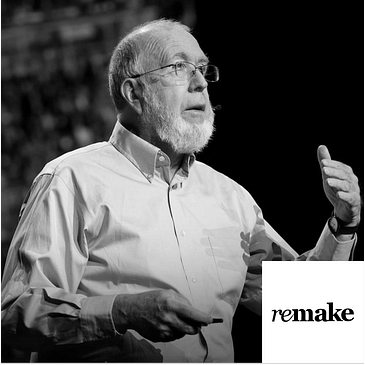One of the most tragic aspects of the accelerating pace of change, and rapid evolution of new technologies — is that we as humanity have lost our elders. We begin to see older generations as detached from the current world of innovation, and have to discount advice and experiences gained in an age that feels so different from our own.
Whereas prior generations could count on a world pretty similar to that of their ancestors, when we look to the future, pretty much the only thing we’re sure of is that it’s not going to look like the past, or even the present.
But we still yearn for some sage advice, at least I know I do. And wouldn’t it be wonderful if we did have someone who could help us navigate a time of tremendous, accelerating change?
That’s why I was so excited to talk to Kevin Kelly.
Kevin is perhaps the closest thing Silicon Valley has to such a sage. Someone who not only witnessed the tremendous rise of digital technology, but thought about it deeply as it was happening and developed models for thinking about it.
In 1993, Kevin co-founded the groundbreaking Wired magazine, and served as its Executive Editor for its first seven years. In 1994, he wrote Out of Control, the classic book on decentralized emergent systems. In 2010 he published What Technology Wants, a robust theory of technology and the complex, almost organic systems that drive it, and in 2017 he published The Inevitable, a New York Times and Wall Street Journal bestseller about the inevitable trends driving technology.
His latest book Excellent Advice for Living: Wisdom I Wish I'd Known Earlier, is an offering of 450 useful aphorisms or principles for living he’s devised over his life amidst the changes.
EPISODE SUMMARY
In this conversation we talk about:
- How did DIY culture shape Kevin's worldview from a young age?
- What inspired Kevin to co-found Wired magazine?
- Why does Kevin claim technology has a will of its own?
- What is his take on AI advances of today?
- Why did he decide to write a book of pithy life advice?
- What is some of Kevin's most counterintuitive advice around decision making and change?
- How can we live fully before our time is up?
My favorite piece of advice in the episode is about choosing a path of change. Without giving away the content, I’ll just say I’ve brought it up multiple times in conversation with friends about their dilemmas, and when considering my own life decisions.
TIMESTAMP CHAPTERS
These timestaps are AI-generated and could prove inaccurate. (Please let us know if you find any issues here: podcast@remakelabs.com )
- Early Making and DIY Culture (00:08:17 - 00:10:16)
- The Origins of Wired Magazine (00:15:18 - 00:17:30)
- Technology's Inherent Tendencies (00:19:32 - 00:22:05)
- AI as Future Partners (00:25:11 - 00:27:02)
- Truth and AI (00:28:17 - 00:31:20)
- Advice for Living Wisdom (00:32:14 - 00:36:39)
- Giving and Getting (00:36:59 - 00:38:16)
- Learning vs "Can't Do" (00:38:57 - 00:39:42)
- Choosing Change (00:40:55 - 00:41:57)
- Embodying Your Full Potential (00:42:24 - 00:44:45)
EPISODE LINKS
-
Kevin Kelly's Links:
- Website: https://kk.org/
- Twitter: https://twitter.com/kevin2kelly
- Organizations: https://kk.org/cooltools/
-
Books, Articles, and Resources Mentioned:
- Wired Magazine: https://www.wired.com/
- Out of Control by Kevin Kelly: https://kk.org/books/out-of-control/
- What Technology Wants by Kevin Kelly: https://kk.org/books/what-technology-wants/
- The Inevitable by Kevin Kelly: https://kk.org/books/the-inevitable/
- Excellent Advice for Living by Kevin Kelly: https://kk.org/books/excellent-advice-for-living/
ABOUT US
- Remake Podcast: Visit us: RemakePod.org
- 🙏🏻 Rate the show on iTunes
- 🙏🏻 Support us! Join the Podcast Member community
- 💌 Share your thoughts: podcast@remakelabs.com
- 👉 Listen or Subscribe to the show: Apple Podcasts・Google Podcasts・RadioPublic・Overcast・Stitcher・PocketCasts・Castro・SoundCloud・Spotify・YouTube・Deezer
- Remake Labs: RemakeLabs.com・Medium・LinkedIn・Community・Twitter・Facebook・Instagram
- Eran Dror: EranDror.com・LinkedIn・Twitter・Medium

